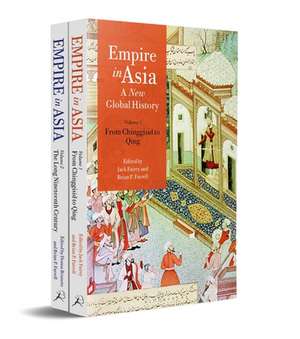Empire in Asia: A New Global History
Editat de Brian P. Farrellen Limba Engleză Quantity pack – 24 feb 2021
Preț: 590.42 lei
Preț vechi: 948.18 lei
-38% Nou
Puncte Express: 886
Preț estimativ în valută:
112.99€ • 116.73$ • 94.04£
112.99€ • 116.73$ • 94.04£
Carte disponibilă
Livrare economică 04-18 martie
Preluare comenzi: 021 569.72.76
Specificații
ISBN-13: 9781350182141
ISBN-10: 1350182141
Dimensiuni: 156 x 234 mm
Greutate: 0.98 kg
Editura: Bloomsbury Publishing
Colecția Bloomsbury Academic
Locul publicării:London, United Kingdom
ISBN-10: 1350182141
Dimensiuni: 156 x 234 mm
Greutate: 0.98 kg
Editura: Bloomsbury Publishing
Colecția Bloomsbury Academic
Locul publicării:London, United Kingdom
Caracteristici
Offers broad coverage, including the Ottoman, Safavid, Romanov, Mughal, Mongol, Ming and Qing empires and the age of 'high imperialism' in Asia
Notă biografică
Brian P. Farrell is Professor of Military History at the National University of Singapore, Singapore. His publications include The Defence and Fall of Singapore, 1940-1942 (2005), The Basis and Making of British Grand Strategy 1940-43 (1998) and Between Two Oceans: A Military History of Singapore from 1275 to 1971 (1999).
Cuprins
Volume I:Volume Editors: Brian P. Farrell (National University of Singapore, Singapore) and Jack Fairey (Independent Scholar)Series Introduction: Reordering an Imperial, Global, Modern Asia (Brian P. Farrell, National University of Singapore, Singapore and Jack Fairey, Independent Scholar)Volume I Introduction: Making Imperial Asia (Brian P. Farrell, National University of Singapore, Singapore and Jack Fairey)1. Inner Asia, 1100s - 1405: The Making of Chinggisid Eurasia (Florence Hodous, Renmin University, China)2. The Great Ming and East Asia: The World Order of a Han-Centric Chinese Empire, 1368-1644 (Wang Jinping, National University of Singapore, Singapore)3. East Asia under the Expanding Qing (Frederik Vermote, California State University, Fresno, USA)4. Southwest Asia, 1300-1800: Ottomans, Safavids and the Turco-Persianate Imperial Tradition (Jack Fairey, Independent Scholar)5. South Asia, 1400-1800: The Mughal Empire and the Turco-Persianate Imperial Tradition (Murari K. Jha, Nalanda University, India)6. Northern Eurasia, 1300-1800: Russian Imperial Practice from Tsardom to Empire (Paul Werth, University of Nevada, Las Vegas, USA)7. In Search of 'Empire' in Mainland Southeast Asia (Bruce Lockhart, National University of Singapore, Singapore)8.In Search of 'Empire' in the Insular Malay World (Sher Banu Khan, National University of Singapore, Singapore)9. Iberian Maritime Asia, 1497-1700s: The Portuguese and Spanish Empires in Asia (Anthony Disney, La Trobe University, Australia)10. Chartered Companies and Empire (Peter Borschberg, National University of Singapore, Singapore)IndexVolume II:Volume Editors: Brian P. Farrell (National University of Singapore, Singapore) and Donna Brunero (National University of Singapore, Singapore)Series Introduction: Reordering an Imperial, Global, Modern Asia (Brian P. Farrell, National University of Singapore, Singapore and Jack Fairey, Independent Scholar)Volume II Introduction: Globalizing Empire in Asia (Brian P. Farrell and Donna Brunero, National University of Singapore, Singapore)1. In the Center of it All: A Pastoral Review of Asian Empire (Thomas DuBois, Independent Scholar)2. Legal Fiction: Extraterritoriality as an Instrument of British Power in China in the Long Nineteenth Century (Robert Bickers, Bristol University, UK)3. East Asian Empire and Technology: Imperial Japan and Mobilizing Infrastructure, 1868-1931 (John DiMoia, Max Planck Institute for the History of Science (MPIWG), Berlin, Germany)4. Suzerainty vs. Sovereignty: Establishing French Empire in Indochina (Bruce Lockhart, National University of Singapore, Singapore)5. Mobilities in Empire: Russian's Asian Empire (Paul Werth, University of Nevada, Las Vegas, USA)6. Staking out an Imperial States System: The Imperial Frontier in Asia in the 'Long Nineteenth Century' (Brian P. Farrell, National University of Singapore, Singapore)7. Faith in Empire: Ottoman Religion and Imperial Governance in the 'Long Nineteenth Century' (Jack Fairey, Independent Scholar)8. Maritime Goes Global: The British Maritime Empire in Asia (Donna Brunero, National University of Singapore, Singapore)9. Empire in Asia: The Long Nineteenth Century? (Odd Arne Westad, Harvard University, USA)BibliographyIndex
Recenzii
In this engagingly written and carefully crafted volume, some of the best scholars in the field bring much needed clarity to the many ways in which empire became truly global in the nineteenth century, with repercussions that can be felt to his day.
Fairey, Brunero, and Farrell have assembled a remarkably far-reaching book, whose many contributions to the debate on empires in Asian and world history are at once provocative and innovative. Weaving together the histories of Asian empires and European empires in Asia from the thirteenth to the nineteenth century, this work poses new questions and challenges established concepts, chronologies, and narratives of both modernity and empire.
Fairey, Brunero, and Farrell have assembled a remarkably far-reaching book, whose many contributions to the debate on empires in Asian and world history are at once provocative and innovative. Weaving together the histories of Asian empires and European empires in Asia from the thirteenth to the nineteenth century, this work poses new questions and challenges established concepts, chronologies, and narratives of both modernity and empire.
